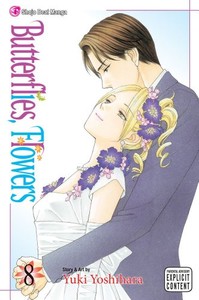Review
by Rebecca Silverman,Butterflies, Flowers
GN 8
| Synopsis: |  |
||
Things have been going along as smoothly as they ever do for Choko Kuze and her lover/boss/servant Masayuki Domoto. That changes, however, when her father proposes an arranged marriage for her – and Domoto doesn't appear to object! Will he ever take “servant” out of his description? As far as Choko is concerned, their future depends on it. |
|||
| Review: | |||
The final volume of Yuki Yoshihara's Butterflies, Flowers comes with the revelation that Yoshihara had a lot of difficulties writing it. In her afterward she tells us that because Choko is unique among her heroines for being docile, her hero ran away with the story, going from “responsible mature man” to “raving sexpot.” This may explain some of the series' quirks, and to some readers may make Viz's choice of this particular work of Yoshihara's to translate surprising. And while earlier series like Aisuru Hito and Itadakimasu may be funnier, Butterflies, Flowers wraps up satisfactorily with Choko making a stand and Domoto coming to terms with his own contradictory feelings for her – or at least enough to make things work. This volume opens with Choko's father suggesting that she attend an arranged marriage meeting. The son of the man who helped the Kuze family set up their soba shop after bankruptcy is interested in her, and because of his financial backing, Choko's dad is afraid to say no. Choko herself has no such qualms, but when Masayuki seems gung-ho about the Kuzes having a chance at regaining some social status, she is at a loss. The outcome of this story arc will be no surprise to regular readers of romance, but it does intersperse genuine angst with jokes and mush nicely. Domoto's now-standard self-referential penis joke is a particularly bizarre one, and should get a laugh for its lunacy, even if that style of humor isn't your thing. Domoto's reservations about social status have been present in the background of all seven previous volumes, but really take center stage here. His need to protect Choko and win back the Kuze family lands has been his driving force throughout, and that comes to the fore to complicate the requisite happy ending. Domoto's bipolar treatment of Choko has been a bone of contention among the series' fans and detractors alike, and the reasons behind it now become clear. While some will still find it hard to forgive him, or at least to like him, Yoshihara does a fine job of detailing just why he is as he is. Choko, on the other hand, gets a chance to show some backbone, standing up for herself and what she wants in a way she's only daydreamed about before. Ultimately she grows as a character more than he does. This is because Choko is determined to put an end to the master/servant relationship. The road to coupledom never has run smoothly – it is that very thing that allows for romance as a genre to exist – and this volume makes things choppier for our heroine than they have been in a while. The fact that she recognizes his issues as unhealthy to their continued relationship is one that readers will cheer. Although in some ways it can be seen as the woman trying to change the man for the sake of the relationship, it is perhaps better viewed in this case as Choko helping her partner to overcome his emotional problems in order to preserve their romance. Most of the series' side characters make a brief appearance in this installment, with Choko's brother Mikihiko getting the most page time. The focus never really shifts from the main duo, though, with the supporting cast seeming more like throwaways this time around. (Yoshihara misses an opportunity with Suou, instead giving us a one-liner.) An ugly American rears his head in an amusing chapter about the Kuze lands, with Yoshihara giving a different stereotype than we usually see in manga. (Although the politically incorrect African American that manga continues to ascribe to is still present.) That chapter is a highlight of the volume, with Choko and Masayuki both making interesting shifts in character. Yoshihara's art continues to be delightful. While her grasp of anatomy is not perfect, bodies are attractive whether naked or clothed, and characters are easy to tell apart. Her chibis are mostly absent this volume, which is unfortunate, but she makes good use of seinen-style horror art in inappropriate places. The smut factor is low here, making this one of Yoshihara's tamest series to date, but where sex scenes are present, they are tasteful and always consensual, a major plus. Butterflies, Flowers has never been the perfect romance, but it has been consistently amusing. Yoshihara ends it on that same note, while also taking time to flesh out Masayuki's insecurities and Choko's feelings about them. With a high humor count, some genuine emotional content, and a very happy ending, the series ends in a way that traditional romance fans will enjoy. |
| Grade: | |||
|
Overall : B+
Story : B+
Art : B
+ Funny moments in both art and storytelling, Choko comes into |
|||
| discuss this in the forum (4 posts) | | |||
| Production Info: | ||
|
Full encyclopedia details about Release information about |
||